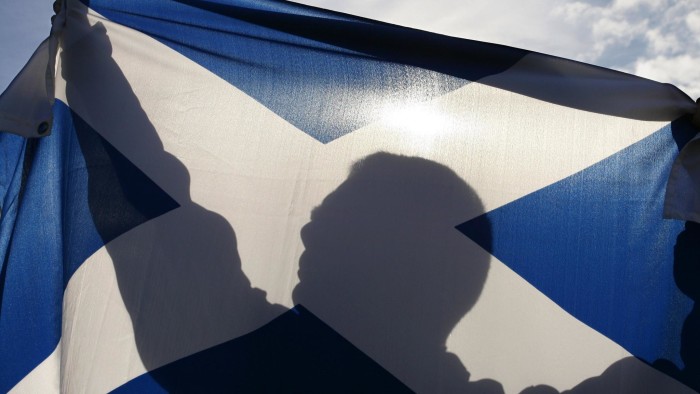Three big questions for Scotland

Simply sign up to the Currencies myFT Digest -- delivered directly to your inbox.
As Alex Salmond and Alistair Darling meet for their second TV debate on Scottish independence, the Financial Times evaluates the position of both camps on three of the biggest subject areas:
CURRENCY
The Scottish National Party says:
An independent Scotland would form a currency union with the rest of the UK. Scots would continue to use the pound and the Bank of England would be the country’s central bank, standing behind its economy and financial sector. Edinburgh would agree a fiscal framework with the rest of the UK setting out borrowing rules. Scotland would have other options, the SNP says, including transitional use of the pound without a formal currency union. But there is no need to set out a Plan B, because a currency union would be agreed, since it would be in the interests of both Scotland and the rest of the UK.
Better Together says:
A currency union would not take place: the Conservative, Labour and Liberal Democrat parties have all made it clear that the rest of the UK would not agree to share its currency and central bank with a foreign state. An independent Scotland would be forced to issue its own currency – leading to higher borrowing costs – or to try to join the euro, a move that would be politically unpopular. Alternatively, Scotland could choose to use the pound unilaterally, as Panama uses the US dollar, but it would have no central bank or control over its monetary policy.
FT verdict:
A currency union would not be in the interests of the rest of the UK: for a start it would mean English taxpayers would be on the hook for any future failure of Scotland’s large financial sector. If Scotland became independent, negotiations would ensue. But a currency union would almost certainly require Edinburgh to cede considerable budgetary supervision to London, as well as financial regulation: would that be acceptable to a newly independent country?
OIL
The SNP says:
Oil and gas from the North Sea will be a bulwark of an independent Scotland, supporting industry and jobs and becoming an important source of revenues. Scotland will be able to maximise extraction and returns more effectively than the UK has and some of the revenues will be put into oil funds to smooth out volatility and invest for the future. Oil and Gas UK says a further 24bn barrels of oil equivalent could still be produced in the North Sea, which would have a wholesale value of up to £1.5tn – a figure greater than the value already extracted.
Better Together says:
An independent Scotland would suffer massive risk from the volatility of North Sea revenues, which can vary hugely depending on oil prices. The difference between peaks and troughs of income would be more than the total NHS budget in Scotland. Production is also declining and it would be impossible to establish a meaningful oil fund given that the Scottish government will be operating with a substantial deficit. Sir Ian Wood, former chair of the Wood Group, has said the Scottish government’s prediction of future tax revenue is much too high, with only 15bn-16.5bn barrels likely to be produced.
FT verdict:
Forecasting revenues is extremely difficult given that volatility in prices, fluctuations in output and oil industry investment have a direct impact on the tax take. The Scottish government substantially overestimated this year’s revenues, for example. Technological advancement and policy reform could help turn marginal fields into profitable ones. A geographic share of the North Sea’s oil and gas resources would be a huge help to the budget of an independent Scotland, but it is unclear if this would match the benefit the country could expect from fiscal transfers within the UK if it rejects independence.
THE NHS
The SNP says:
Scotland’s devolved NHS relies much less on private sector provision. However, the Yes camp argues that health service privatisation south of the border will eventually lead to less funding from Westminster, as private cash replaces public investment.
They argue the break-up of the NHS in its current form is now in prospect and the only way to shield the Scottish people is through the constitutional independence Scotland’s health service would gain from a Yes vote, which could guarantee its continuation as a free, universal service.
Better Together says:
Scotland’s current health funding would be at risk if the country votes for independence.
About £200 more per head is spent on patients north of the border. Pro-unionists say this settlement, significantly higher than is justified by the country’s population size alone, is part of the reason the Scottish government has been able to break step with England by offering free prescriptions and free personal and nursing care for elderly people.
They argue the SNP has not demonstrated how it would fund the health service to its current, comparatively generous level.
FT verdict
Despite the claims of critics, the pace of private sector involvement in the NHS has slowed in the past four years. While this may change after the general election in 2015, the fears conjured by the Yes campaign are currently overdone.
Nor does Scottish exceptionalism make the difference its proponents claim. A major study by the Nuffield Trust in April suggested the performance of the health service in Scotland had improved in relation to England. But the policies that had made the difference were UK-wide – such as waiting list targets – not the result of devolved decision-making.
Comments